How many of you like to travel? How many of you find the thought of a great voyage or adventure to be exciting?

How many of you find that however wonderful travel can be it is always great to be back home?
Whether you like to travel, like an adventure, or whether you like getting home, Great Lent is for you. Great Lent is a great spiritual sojourn, a great adventure to the kingdom of heaven, and as it turns out, this heaven to which we are sojourning is also our home!
The Christian sojourn is not traveling to a far-off foreign country, but instead it is a journey to the home God created for us from the beginning. Today in the Church we also remember the expulsion of Adam and Eve from Paradise. Paradise was the place God created to be our home, but we no longer live in Paradise. This is reality. The Scriptures tell us of why Adam and Eve had to leave their home in Paradise, they were expelled from the home God made for them and us because of their own rebellious sin.

At Vespers on the eve of Forgiveness Sunday one of the hymns says:
Adam ate the forbidden fruit and was driven from Paradise.
He sat outside, weeping bitterly:
“Woe to me! What will become of me, a worthless man?
I disobeyed one command of my Master and lost every good thing!
O holy Paradise, planted for me by God, and closed by the weakness of
Eve,
grant that I may once again gaze on the flowers of your gardens!”
The Savior said to him:
“I do not wish the death of my creation!
I desire that all should be saved and come to the knowledge of the truth,
for him who comes to me I shall never cast out!”
Adam and Eve lost not only their home but also lost their way home. And in them, so did we all. They couldn’t get back to that home they had lost. But Christianity says there is a way home. So in another hymn from Vespers we sing:
O Paradise, garden of delight and beauty,
dwelling-place made perfect by God,
unending gladness and eternal joy,
the hope of the prophets and the home of the saints,
by the music of your rustling leaves beseech the Creator of all
to open the gates which my sins have closed,
that I may partake of the Tree of Life and Grace
which was given to me in the beginning!

Even the leaves in paradise when they rustle create music which calls to us to return. And when we think about this beautiful paradise we should feel homesick because this world is full of problems – violence, disease, war, pain, sorrow, addiction, emotional illness, shattered marriages, dysfunctional families. Something is wrong in this world and with this world. Sin has shattered our lives. We have lost touch with God.
Yet, the fact that we can recognize there is a problem gives us hope. We don’t find ultimate purpose of life in this world, but it is available to us in the life in the world to come. We can believe there is purpose and meaning to life despite the sorrows and problems of this world because we understand this world is only a small part of the totality of creation, and life here is a tiny portion of the big history or creation. We can believe that there is a better way, and trust that there is a God to help us. Thus we can be full of hope.

Many years ago I read a book called Emotions Anonymous In which a physician wrote these words:
“As a doctor it took me a long time to find that actually relieving pain is not my goal. I found that behind all the suffering, pain, diseases, and all the conditions that cause dis-ease, lie the thirst and the hunger of the human being for spirituality.
This hunger and thirst is the aspiration of a human being to be a whole again.” (p 18)
This physician was describing what we Orthodox have known for centuries. He went on to say about this world:
“I believe
We want to have no conflict, but we still have conflict.
We want life to be perfect here and now but it is far from perfect.
We want to have constant pleasure but we have pain.
We so want to succeed in every effort we make that when we fail in one area we reject not only our actions but ourselves as well.
We become very fearful.
We try to impress other people by being something we are not, by being phony.
We find ourselves being resentful toward people and life.
We become experts as manipulating people.
We become very self-centered.” (Emotions Anonymous, p 29)

In so many ways he is describing the same things we read in the Scriptures about the expulsion of Adam and Eve from Paradise and why we struggle on earth with pain and sorrow. He is describing the descent into sin and a world which is broken.
And when we allow ourselves to truly look at this world, we realize all of the things of this earth not only are intermixed with pain and sorrow but they also are transient, all is passing away.
And so we can think about Christ’s words: “Where your treasure is, there your heart will be.” Our treasure should be our true home that Kingdom of God which is true, permanent and eternal, rather than being the things of this world which are intermixed with grief and pain. We should prefer the eternal and everlasting Kingdom to the temporary and transient things of this world which in any case will all pass away.

Great Lent calls us to look for the eternal even though we live in the temporal world. Great Lent reminds us that we really do love these temporary things of this world – our favorite foods, the comforts of home, being entertained, the abundance of the earth. But all we need to do is look around and realize we continue to age, we really are sojourners on this planet and are here only a short time. Not only are our lives on earth temporary, but everything we so love on earth will pass away as well.
And as we think about all of this we come to the words of the Prophet Hosea in which God himself musing about his own love for Israel says: “Therefore, behold, I will allure her, and bring her into the wilderness, and speak tenderly to her.” (Hosea 2:14)

God in His love for His people calls us into the wilderness, into the desert to find Him and to find our way home. Great Lent is a sojourn, it is the journey into the desert where we find God’s love and our way home to God. We experience in Lent some discomfort, some self-denial, to awaken in ourselves the knowledge that we are not in our permanent home but are just passing through this life on the way to our home. Fasting is a spiritual discipline to help us put this world and our lives into a proper framework so that we can seek that which is eternal as well as that which is our true home.
When we think about fasting, we also have to consider that before teaching us about fasting, Jesus spoke first about forgiveness as we see in today’s Gospel.
For if you forgive men their trespasses, your heavenly Father will also forgive you. But if you do not forgive men their trespasses, neither will your Father forgive your trespasses. Moreover, when you fast, do not be like the hypocrites, with a sad countenance. For they disfigure their faces that they may appear to men to be fasting. Assuredly, I say to you, they have their reward. But you, when you fast, anoint your head and wash your face, so that you do not appear to men to be fasting, but to your Father who is in the secret place; and your Father who sees in secret will reward you openly. Do not lay up for yourselves treasures on earth, where moth and rust destroy and where thieves break in and steal; but lay up for yourselves treasures in heaven, where neither moth nor rust destroys and where thieves do not break in and steal. For where your treasure is, there your heart will be also. (Matthew 6:14-21)
In the Gospel, Christ teaches us first about forgiving and then fasting. Before we begin the fast we are to forgive. We cannot pursue the heights of spirituality without first ridding ourselves of the depth of anger and resentment by forgiving one another.

St Gregory the Great said even sinners and demons can perform spectacular miracles (Pharaoh’s magicians for example did). St Gregory says forgiving is an even a greater miracle than healing the sick, and every Christian is capable of performing the miracle of forgiveness. Demons and sinners are not able to perform the miracle of forgiveness. Perform a miracle today, forgive someone who has offended you or who owes you or against whom you have a grudge.
You are God’s servant, does it serve God for you to hold on to a grudge, a hurt, the anger, the resentment?
The journey we are about to undertake is a spiritual sojourn, and the desert through which we must traverse turns out to be our own hearts which have become hardened, barren and arid by our experiences in this world. But now we are being called by God to turn away from the world and to come into the desert to meet Him, to turn our hearts into the very place where we will meet God face to face. The experience of God awaits us if we will undertake the journey.

We are preparing ourselves to commemorate the Resurrection of our Lord, not as past history, but as our own experience, our history, Christ is risen from the dead, not Christ was risen. We celebrate this yearly because it is our personal experience, and our community’s experience, not just something that happened to people long ago. We are to enter into that experience and make it our own. I do this because of what the Lord has done for me. God has blessed us in this world and invites us into that blessed life in the world to come. Are you ready to make this sojourn home?



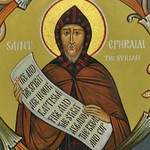




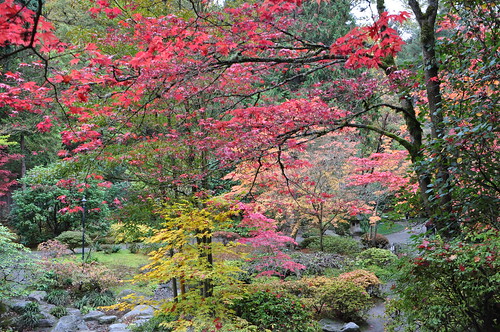

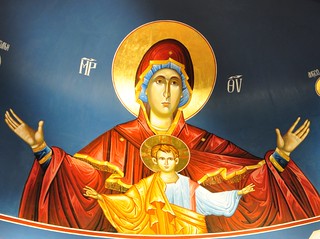

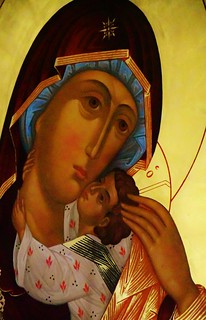

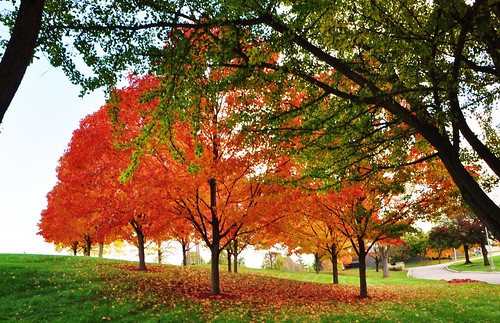



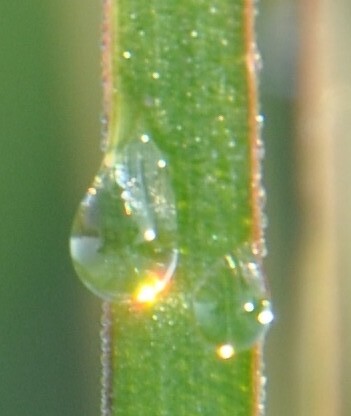




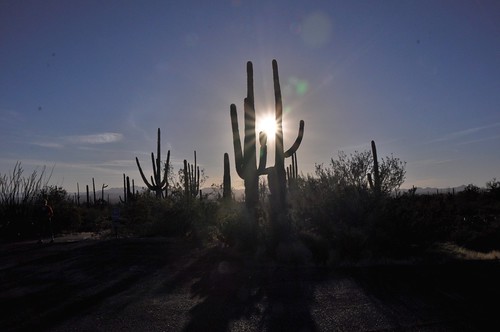



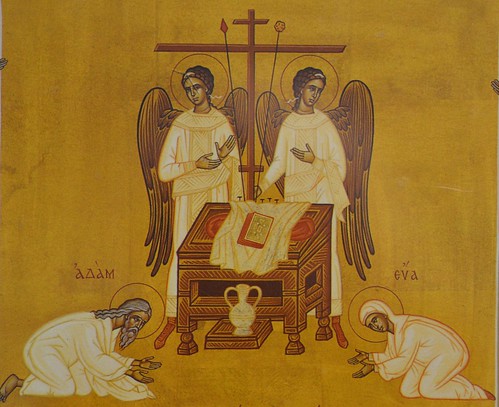
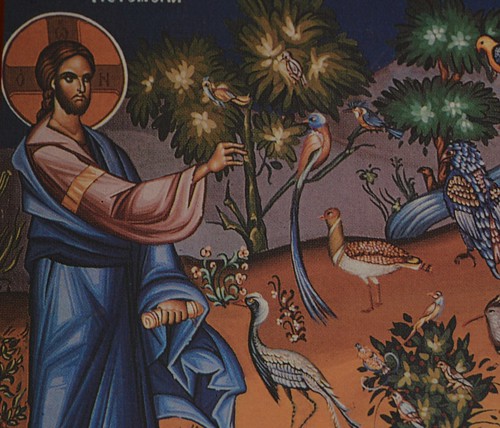
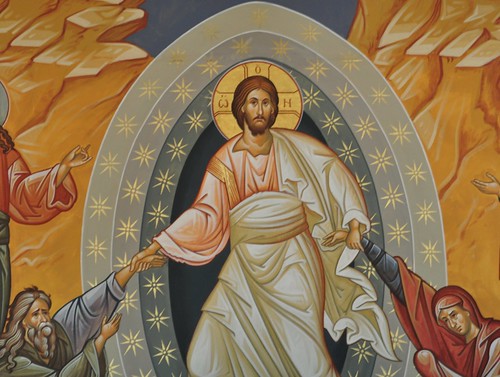

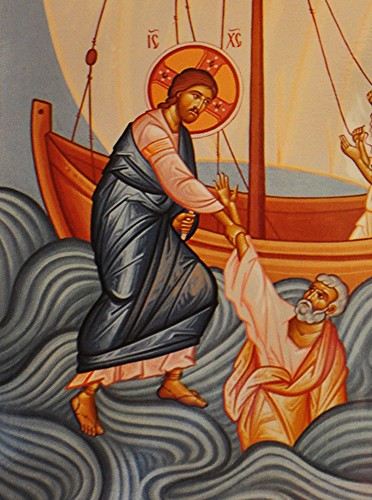
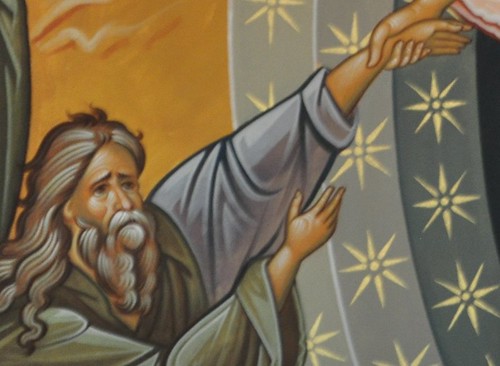

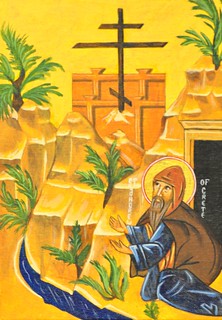
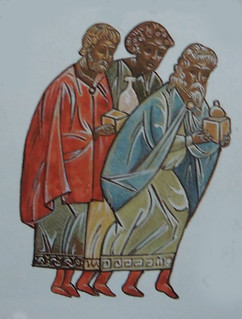











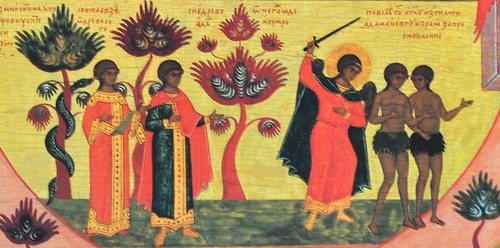

 Many of the hymns from the canon are spoken in the first person, “I”. The hymns are Adam’s lamentation over what he had done and what he had lost through disobedience. There also is some ambiguity in the canon hymns as to whether the “I” is Adam speaking or whether it is each of us (who are reading or hearing the text) recognizing the effects of the Fall on our lives. The hymn suggests that the importance of the narrative of Adam is not so much as a historical account of the first human as it is a prototypical story – the story of each of us. Adam’s story is the story of each human being – Adam’s story is my story. I’m in the world I’m in and I’m in the relationship to God that I’m in because I have lived and behaved exactly as Adam lived and behaved. I stand in the shoes of Adam or Eve (so to speak – if they had any) and I come to realize I’m him or her and they are me. Adam’s lamentation over his loss and his exile needs to become my lamentation in this world, if I’m ever to learn what it is to be truly and fully human.
Many of the hymns from the canon are spoken in the first person, “I”. The hymns are Adam’s lamentation over what he had done and what he had lost through disobedience. There also is some ambiguity in the canon hymns as to whether the “I” is Adam speaking or whether it is each of us (who are reading or hearing the text) recognizing the effects of the Fall on our lives. The hymn suggests that the importance of the narrative of Adam is not so much as a historical account of the first human as it is a prototypical story – the story of each of us. Adam’s story is the story of each human being – Adam’s story is my story. I’m in the world I’m in and I’m in the relationship to God that I’m in because I have lived and behaved exactly as Adam lived and behaved. I stand in the shoes of Adam or Eve (so to speak – if they had any) and I come to realize I’m him or her and they are me. Adam’s lamentation over his loss and his exile needs to become my lamentation in this world, if I’m ever to learn what it is to be truly and fully human. Great Lent works in a certain reverse way to teach me the sense of exile and loss. For by keeping the fast, and denying myself the things of this world, I come to feel the sense of loss for this world, and I begin to feel exile from the life I love. Only when I feel the loss of the comfort of this world and am indeed feeling exiled, do I come to realize the reality is this world which I love and cling to so much is the exile. Here on earth I’m not blessed with the life in Paradise – that Garden of Delight from which Adam, and I, are really exiled. This world which I’m so reluctant to give up during Lent – its foods, comforts, entertainment, pleasures – are in fact part of the exile from the true existence which God created us for! I’ve fallen in love with and become addicted to the world of exile! Great Lent is trying to remind me of that spiritual reality which I have lost. Great Lent is trying to help me become Adam and Eve lamenting over their great loss, so that I can learn not to live for this world alone, but to long for that Paradise in which I will be with God as Eve and Adam once were.
Great Lent works in a certain reverse way to teach me the sense of exile and loss. For by keeping the fast, and denying myself the things of this world, I come to feel the sense of loss for this world, and I begin to feel exile from the life I love. Only when I feel the loss of the comfort of this world and am indeed feeling exiled, do I come to realize the reality is this world which I love and cling to so much is the exile. Here on earth I’m not blessed with the life in Paradise – that Garden of Delight from which Adam, and I, are really exiled. This world which I’m so reluctant to give up during Lent – its foods, comforts, entertainment, pleasures – are in fact part of the exile from the true existence which God created us for! I’ve fallen in love with and become addicted to the world of exile! Great Lent is trying to remind me of that spiritual reality which I have lost. Great Lent is trying to help me become Adam and Eve lamenting over their great loss, so that I can learn not to live for this world alone, but to long for that Paradise in which I will be with God as Eve and Adam once were.
 Adam is presented in the hymns of having the awareness to lament over his loss – this is repentance, his changing his heart and mind to embrace the goodness that God gave him in the beginning. We are being called to recognize Adam’s loss as our own. If we are ever to love Christ and follow Him, we have to embrace the notion of our exile in this world, rather than embracing the pleasures of this world and rejecting Paradise!
Adam is presented in the hymns of having the awareness to lament over his loss – this is repentance, his changing his heart and mind to embrace the goodness that God gave him in the beginning. We are being called to recognize Adam’s loss as our own. If we are ever to love Christ and follow Him, we have to embrace the notion of our exile in this world, rather than embracing the pleasures of this world and rejecting Paradise! Ranks of angels,
Ranks of angels, Blessed meadow, trees and flowers planted by God,
Blessed meadow, trees and flowers planted by God, And the LORD God
And the LORD God and now, lest he put forth his hand
and now, lest he put forth his hand Now Abel was a keeper of sheep, and Cain a tiller of the ground.
Now Abel was a keeper of sheep, and Cain a tiller of the ground.